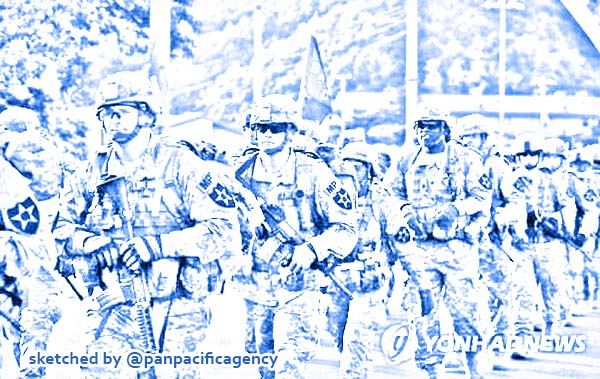Trump turns US Forces Korea into ‘transactional’ army

U.S. troops in Korea engage in an exercise. They have served as a key deterrent to North Korean invasions but their commander-in-chief, President Donald Trump, has attacked its relevancy. Yonhap. Sketched by the Pan Pacific Agency.
SEOUL, Aug 16, 2019, The Korea Times. U.S. Forces Korea (USFK) is under attack not by enemy but by its own commander-in-chief, President Donald Trump. Trump is prioritizing the size of the bill host Korea pays toward upkeep and is indulging himself in an unwarranted bromance with the head of the enemy, reported The Korea Times.
The risk is bringing confusion to the mission and raison d’etre of the peacekeepers and freedom fighters who have stood ready for decades to throw down their lives to help protect Koreans from North Korean invasions and assert a U.S.-led balance of power in the region where interests of big powers often clash. So a blow to the USFK credibility is feared.
Already, Trump’s first defense secretary, James Mattis, the soldier of the soldiers, called it quits over Trump’s acts of belittling the allies, calling them freeloaders being piggybacked by the U.S., and his boss’s readiness to sleep with enemies like the North’s young dictator Kim Jong-un and Russia’s Vladimir Putin.
With Mattis out, there has been no stopping Trump, who has become even more eager to get his message as “transactional” promoter of American interests across the voters for his re-election in the November 2020 vote.
As hosts, Koreans are getting tired of his incessant demand for more money despite their appreciation of a key role played by U.S. troops here to keep the North at bay. But some of them openly questioned whether Trump is relegating USFK to the level of hired guns or a bunch of soldiers of fortune.
Recently, the New York Post reported that Trump has boasted that it was easier to extract a billion dollars from Korea than a delayed payment of $114.13 in apartment rent ― a reference to his being a real estate developer.
This report followed a reported U.S. demand that Korea should pay $5 billion in the so-called cost sharing burden needed to keep the USFK in Korea. It is five times the $850 million Korea has paid for this year. Trump also said that Korea has paid little in protection money.
One commentator wondered aloud whether if Korea pays what the U.S. reportedly demands, it would make GIs mercenaries that work for money with no regard to common cause and purpose.
USFK commander, Gen. Robert Abrams stresses the importance of the alliance whenever he has a chance and even the visiting new Secretary of Defense Mark Esper referred to the two countries’ alliance as being iron-clad.
Rarely does Trump talk about the state of the alliance or even the a-word itself.
He was heard saying, he saved Korea from war, when he visited the South-North border June 30 before meeting the North’s Kim.
Also worrisome are Trump’s dealings with Kim. He has dismissed Kim’s daily missile tests as nothing unusual, even though they involved ballistic missiles, so were in violation of the current international sanctions.
He often called Kim’s letters “beautiful” and took sides with Kim when the North Korean apparently complained about the allies’ simulated exercise. The American president said that he didn’t like the exercise either because it costs too much.
Following their first summit in Singapore, Trump revealed that the U.S. wouldn’t hold key joint military exercises with South Korea unilaterally without consulting it in advance.
Military exercises are key to maintaining readiness, especially to the current formula of alliance in which forces of Korea and the U.S. should work together under the combined command structure, their importance can’t be over-emphasized as they can save the soldiers’ lives in real battle. It is not fair to deprive GIs as well as Korean soldiers of training they deserve in the job that they put their lives on the line for.
The “Trumpification” of the USFK is taking place in the context of the escalating contest of hegemony between the U.S. and China. It is seen as a move by the U.S. to reduce its commitment, while the erstwhile beneficiaries are starting to contemplate whether an era of Pax Americana is coming to an end.
The U.S. withdrawal has already been confirmed in Europe where the U.S.-led NATO security structure is now reduced to a shadow of its former self as the result of Trump’s incessant attacks, giving rise to the revanchist Putin of Russia.
We may be witnessing a multipolar world order with the U.S. being diminished to one of the regional powers together with the rising China and resurgent Russia with Europe thrown in a lump.
Likely to come together are rogue states like North Korea that would behave more freely than before in a world where neither universal rules of governance nor their enforcers exist.
One day, we may remember today as the end of the belle epoch leading to a brave new world and Trump in footnote as a facilitator. USFK would be one of victims like other alliance structures that fell under the sword of Trump’s mercantilism.
Oh Young-jin is the digital managing editor of The Korea Times